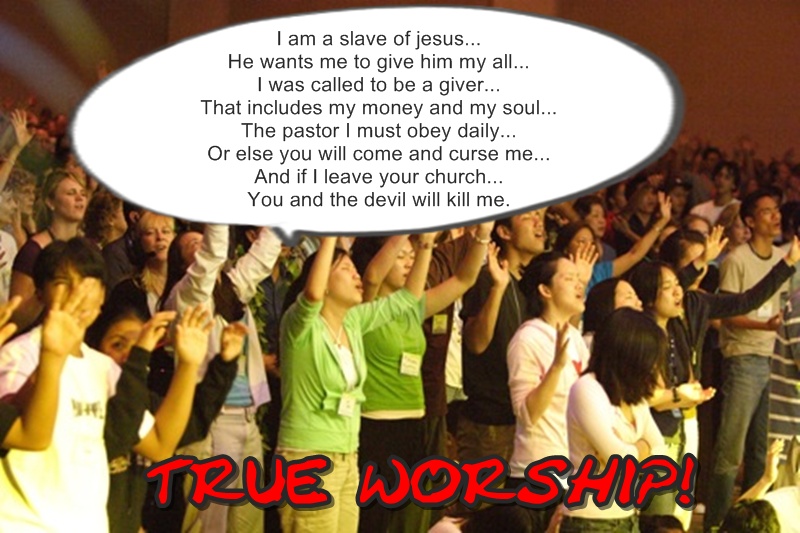Mark Fulton
[SOURCE]
“I could never feel really loved and cared for by Jesus. Intellectually I believed that he loved me, but I needed someone to hug me and tell me that I was important. If my own parents couldn’t or wouldn’t do that, why would Jesus? I wanted physical nurturing, not just some fantasy of love. But, because my parents were neglecting their children supposedly for God’s work and to save people from going to hell, how could I complain or ask for more of their time without feeling terribly guilty?”—Nick, the son of a minister
Church members are expected to buy into belief in the superstitions and dogma in the Bible, and to bow down to those propounding it. Institutional Christianity is, and always has been, a power game. Priests, pastors, and other preachers, claiming to speak with God’s authority, assume they are the main arbiters of people’s lives. They take on the role of life coaches, and many of them become intoxicated with the power that brings.
The typical church service has information going only one way, from the preacher to the congregation. The “all the answers you ever need are right here” perspective is a very rigid and flawed approach to life. To preach that week after week, as many of them do, is repressive and indicative of a cursory dismissal of people’s individuality.
Most preachers are poorly qualified for the job of a “life coach.” Bible school, or whatever its equivalent may be, is hardly a solid foundation from which to preach morality, ethics and coping skills. In fact, in my opinion, one could hardly start from a lower base.
What can “a man of God” offer people in need of help and guidance? I would say less than nothing, unless they happen to also be genuine humanists. Too often their answer to problems is to pray, to read the Bible, or to moderate worldly aspirations. They even sometimes claim that a miserable life is not such a bad thing: “Blessed are the poor in spirit.” They tell people to focus on the promise of eternal salvation, a pot of gold at the end of life’s rainbow, granted only to those special people who have faith, rather than address real problems in the here and now. They even may advise avoidance of real help from others, as they are paranoid about outsiders treading on their turf.
Most church leaders hope people behave like sheep. Sheep are subservient, easily scared, don’t cause trouble and don’t think for themselves. While these leaders are filling the sheep’s heads with mythical nonsense, they can tax their income.
Preachers portray themselves as warm, caring people, and some of them are. But too often they are egotists, people who revel in being admired and listened to. That colors any message they deliver, because the focus is not on furnishing happiness for others, but on procuring personal power, adulation and cash.
 Preachers are also often hypocrites. The vaunted love said to be the hallmark of the Christian is often not to be found when they are asked for real help, particularly if people’s problems are complex and time-consuming. Most preachers, particularly those in larger churches, find it easier to tell people they will be prayed for than to help them. This is nothing more than a convenient evasion of responsibility.
Preachers are also often hypocrites. The vaunted love said to be the hallmark of the Christian is often not to be found when they are asked for real help, particularly if people’s problems are complex and time-consuming. Most preachers, particularly those in larger churches, find it easier to tell people they will be prayed for than to help them. This is nothing more than a convenient evasion of responsibility.
Sadly, the so-called guidance people get from churches often degrades their individualism and thwarts the search for pragmatic answers. Going to church is a surefire way to not find real solutions to problems, as the personal problems of sheep get spurned. It is easier to lecture a crowd than to give a bona fide helping hand to an individual.
It facilitates crowd control to get the people groveling at the feet of the mute, divine Jesus.  The master’s cold eyes stare down at them from the crucifix. The crowd fails to appreciate the obvious: that there is no point singing the praises of an obscure Jewish peasant, or in pretending he is their friend. A real friend talks, but Jesus hasn’t uttered a word for nearly two thousand years. He’s not able to tell them to stop being so stupid, because he’s dead.
The master’s cold eyes stare down at them from the crucifix. The crowd fails to appreciate the obvious: that there is no point singing the praises of an obscure Jewish peasant, or in pretending he is their friend. A real friend talks, but Jesus hasn’t uttered a word for nearly two thousand years. He’s not able to tell them to stop being so stupid, because he’s dead.
 The master’s cold eyes stare down at them from the crucifix. The crowd fails to appreciate the obvious: that there is no point singing the praises of an obscure Jewish peasant, or in pretending he is their friend. A real friend talks, but Jesus hasn’t uttered a word for nearly two thousand years. He’s not able to tell them to stop being so stupid, because he’s dead.
The master’s cold eyes stare down at them from the crucifix. The crowd fails to appreciate the obvious: that there is no point singing the praises of an obscure Jewish peasant, or in pretending he is their friend. A real friend talks, but Jesus hasn’t uttered a word for nearly two thousand years. He’s not able to tell them to stop being so stupid, because he’s dead.
People are told that when they are “saved” or have “accepted Jesus,” they will experience happiness and a wonderful life, but that is rarely true. Many Christians are, in fact, agitated, intense, and stressed. Others are resigned, sad, have low self-esteem, or go through life just pretending to be happy. Mother Theresa, a most unfortunate woman indeed, was a classic example of this. Many Christians are plagued by ambiguity and uncertainty and some are reluctant to accept help from health professionals and other outsiders. Many feel guilty about sexual desires and imagine they are evil. They often resent or are angry about sexual freedoms in the secular world. Most Christians are still frightened of hell.
It is problematic to come up with truly objective information to support these claims, because it is very difficult to measure Christian religiosity, hard to measure psychological damage, and akward to prove a causal relationship between the two. Despite that, the following psychological problems are well recognized by many respected doctors and psychologists as consequences of belief in Christian dogma.
Self-Esteem
While most humanists consider that a person enjoys mental health by being strong, resilient, autonomous, and assertive, Christianity emphasizes that people must be subordinate to God, and that personal identity resides primarily in the relationship to God.
In other words individuals are worthless without God in their hearts, a recurrent theme in Paul’s writings:
“For if a man think himself to be something, when he is nothing, he deceiveth himself” (Gal. 6:3, KJV), and
“Nay but, O man, who art thou that repliest against God? Shall the thing formed say to him that formed it, Why hast thou made me thus? Hath not the potter power over the clay, of the same lump to make one vessel unto honor, and another unto dishonor?” (Rom. 9:20–21, KJV), and
“For I say, through the grace given unto me, to every man that is among you, not to think of himself more highly than he ought to think; but to think soberly, according as God hath dealt to every man the measure of faith” (Rom. 12:3, KJV).
In my opinion Paul tried to make people feel small so that he himself, felt big. Paul’s agenda was focused on magnifying his own importance and in controlling others. Many of today’s preachers are little different, so they find Paul’s writings very useful.
Yet Paul wasn’t the only Biblical author guilty of this. A commonly quoted part of scripture is
“Pride goeth before destruction, and an haughty spirit before a fall” (Prov. 16:18, KJV), written by we don’t know who, but he was probably a Jewish priest. He thought ordinary people mustn’t be proud or God will put them back in their place!
As a consequence of dogma such as this, many Christians have a deep, even subconscious belief that they are basically bad or flawed. Christian women, in particular, can have their self-esteem crushed by believing the Bible.
This contrasts starkly with Aristotle’s humanist ethos that a healthy self-esteem, being the mean between undue humility and empty vanity, is both honorable and necessary.
The Bible claims people can rise above their lowly state by receiving “grace” from God. The family dog might wag his tail when his master pats him on the head, but people need more than an imaginary pat on the head to have real self-esteem. Fictitious grace from an illusive god does little for someone who has been told they are nearly worthless.
Psychologists today stress the importance of high regard for oneself. Many liberal preachers have in recent times claimed people are worthy and lovable, yet in the next breath tell them Jesus died for them because they are sinners.
I encourage all Christians to recognize your own power and worth. You are unique, valuable and beautiful, particularly if you decide to believe it. Your own intellect is far more real and powerful than anything written in the Bible. Don’t let church people tell you anything different.
Thought and Emotion Suppression
The biblical authors tried to suppress individualism, and freethinking.
“Casting down imaginations,” wrote Paul, “and every high thing that exalteth itself against the knowledge of God, and bringing into captivity every thought to the obedience of Christ” (2 Cor. 10:5, KJV.) Paul made it clear that all thoughts not focused on obeying Christ were sinful. He claimed he knew God’s intentions. I think he just wanted to control what people thought!
“Ye have heard that it was said of them of old time, Thou shalt not kill; and whosoever shall kill shall be in danger of the judgment: But I say unto you, That whosoever is angry with his brother without a cause shall be in danger of the judgment: and whosoever shall say to his brother, Raca, shall be in danger of the council: but whosoever shall say, Thou fool, shall be in danger of hell fire” (Matt. 5:21–22, KJV), and
“But I say unto you, That whosoever looketh on a woman to lust after her hath committed adultery with her already in his heart” (Matt. 5:28, KJV). Natural emotions are bad. God is watching and judging your very thoughts, your heart rate and how much you sweat.
A Christian upbringing that promotes this toxic nonsense can damage the ability to feel free, open, and relaxed in one’s own skin. To experience and express emotion is essential for mental well-being. Feelings help us come alive; to make decisions and understand our fellow man. We have a right to them. They are what they are, not bad or wrong.
Reliance on Faith
Church leaders teach that if people have faith they can achieve anything through the power of prayer. They often quote Jesus, who allegedly said,
“For verily I say unto you, That whosoever shall say unto this mountain, Be thou removed, and be thou cast into the sea; and shall not doubt in his heart, but shall believe that those things which he saith shall come to pass; he shall have whatsoever he saith. Therefore I say unto you, What things soever ye desire, when ye pray, believe that ye receive them, and ye shall have them”(Mark 11:23–24, KJV). Christian literature is full of dubious anecdotal stories about the power of prayer and faith. But Christians’ prayers are never answered, despite what some of them claim.
In reality, people’s self-esteem can suffer when they earnestly pray for something and it doesn’t happen. Why is Jesus not responding to me?
Prayer diverts people away from pursuing rational solutions to problems, and that, in my opinion, is a tragedy. “Let’s pray for Aunt Mavis who has a fractured hip” replaces “let’s get Mavis walking, improve her diet, and give her vitamin D so she doesn’t suffer another fracture.”
Paul wrote that Christ “always causes us to triumph” (2 Cor. 2:14, KJV). Yet some Christians can’t pass exams, find a job, find a partner, or pay their bills. We only triumph if we make good things happen, not because we have faith in an imaginary buddy in the sky.
Children and the Burden of Shame
Children in fundamentalist families are often regarded as little adults, with the same sinful tendencies and the same need to be “saved.” Consequently, there may be little or no realization that a growing child needs to progress through various stages of cognitive and emotional development.  Instead, childhood issues such as egocentrism, aggression, sexuality, and teenage rebellion are labeled as sins, instead of natural and predictable processes. The “sin” is attributed to an innate fault in their natures that needs to be corrected, the child is made to feel ashamed of him or herself, and is disciplined accordingly: “Shame on you,” “You’re so selfish. What’s the matter with you?” “You know Jesus sees you when you do that!” The focus is on guilt, control and force, instead of fostering self-confidence and new coping skills. The innocent child feels they are defective, bad, inadequate, or a failure. They become filled with shame.
Instead, childhood issues such as egocentrism, aggression, sexuality, and teenage rebellion are labeled as sins, instead of natural and predictable processes. The “sin” is attributed to an innate fault in their natures that needs to be corrected, the child is made to feel ashamed of him or herself, and is disciplined accordingly: “Shame on you,” “You’re so selfish. What’s the matter with you?” “You know Jesus sees you when you do that!” The focus is on guilt, control and force, instead of fostering self-confidence and new coping skills. The innocent child feels they are defective, bad, inadequate, or a failure. They become filled with shame.
 Instead, childhood issues such as egocentrism, aggression, sexuality, and teenage rebellion are labeled as sins, instead of natural and predictable processes. The “sin” is attributed to an innate fault in their natures that needs to be corrected, the child is made to feel ashamed of him or herself, and is disciplined accordingly: “Shame on you,” “You’re so selfish. What’s the matter with you?” “You know Jesus sees you when you do that!” The focus is on guilt, control and force, instead of fostering self-confidence and new coping skills. The innocent child feels they are defective, bad, inadequate, or a failure. They become filled with shame.
Instead, childhood issues such as egocentrism, aggression, sexuality, and teenage rebellion are labeled as sins, instead of natural and predictable processes. The “sin” is attributed to an innate fault in their natures that needs to be corrected, the child is made to feel ashamed of him or herself, and is disciplined accordingly: “Shame on you,” “You’re so selfish. What’s the matter with you?” “You know Jesus sees you when you do that!” The focus is on guilt, control and force, instead of fostering self-confidence and new coping skills. The innocent child feels they are defective, bad, inadequate, or a failure. They become filled with shame.
Shame is more damaging than guilt, when we feel bad because of what we have done, not because of who we essentially are. Shame takes a heavy toll on a child’s self-esteem, and often becomes a part of their psyche that persists into adulthood.
On the other hand, good parents know that poor childhood behavior is linked to needs, not to a flawed nature, and is part of a child’s natural development.
Pretense
Christians are told if they believe in Jesus they will be happy. If they happen to be unhappy, an all too common occurrence, their Christian superiors typically imply the sad person doesn’t have enough faith, so they need to work on their relationship with Jesus.
Inevitably many miserable Christians hesitate to admit their problems, and pretend to the world that everything is fine. They don’t want to admit Jesus is ignoring them. They are so worried what others will think of them they fail to get help.
There is no doubt that Christianity fosters a culture of pretense, which is most unfortunate, because pretense is the antithesis of authenticity. To have a great life we need to be authentic with each other, admit problems we have, and seek help, not from a mythical god or Jesus, but from our fellow humans.
Fear of Hell
The fear of hell is one of the most ingrained, damaging, nasty aspects of Christianity. The notion of such a place as hell makes God a sadistic, petulant, and abominable dictator.
Many Christian authorities have used the fear of hell to control and profit from exploitable victims. This has been happening for centuries, and is one of the reasons churches have been so successful for so long.
The Christian is still told today that his life is the basis for judgment in the next. The Purpose-Driven Life, written by Rick Warren, is a very popular Christian book in Evangelical circles. Over 30 million copies have been sold. He writes,
“One day you will stand before God, and he will do an audit of your life, a final exam, before you enter eternity…he will ask us two crucial questions…First, ‘What did you do with my Son, Jesus Christ?’…Second, ‘What did you do with what I gave you?’…the second question will determine what you do in eternity…At the end of your life on earth you will be evaluated and rewarded according to how well you handled what God entrusted to you. That means everything you do…has eternal consequences.” Imagine how that affects people’s peace of mind! He is sourcing this idea directly from the ubiquitous Paul:
“For we must all appear before the judgment seat of Christ; that every one may receive the things done in his body, according to that he hath done, whether it be good or bad” (2 Cor. 5:10, KJV.)
“But why dost thou judge thy brother? or why dost thou set at nought thy brother? for we shall all stand before the judgment seat of Christ” (Rom. 14;10, KJV). Paul even thought God could read people’s thoughts:
“We are not trying to please men but God, who can read our inmost thoughts” (1 Thess. 2:4, KJV.)
Paul taught that our earthly life was a mere prelude to the big judgment. No wonder he was so habitually anxious. His spiel did not come from God, but from his own agitated imagination.
Jesus, too, repeatedly threatened people with hell. He warned them to be ever on their guard, as the end of time, when everyone will be judged, could be just around the corner:
“And this know, that if the goodman of the house had known what hour the thief would come, he would have watched, and not have suffered his house to be broken through. Be ye therefore ready also: for the Son of man cometh at an hour when ye think not” (Luke 12:39–40, KJV.)
Jesus warned people that all their secrets would be made public in the afterlife:
“For there is nothing covered, that shall not be revealed; neither hid, that shall not be known. Therefore whatsoever ye have spoken in darkness shall be heard in the light; and that which ye have spoken in the ear in closets shall be proclaimed upon the housetops” (Luke 12:2–3, KJV). There is no place to hide from an ever-vigilant God. Just like Santa Claus, he knows when you’ve been bad. He is watching when you go to the toilet and when you close the bedroom door, and one day he’s going to tell everyone what you’ve been up to.
God’s going to be very busy spreading gossip in the afterlife! He’s got all eternity to do it. It may be quite titillating to hear what one’s neighbours got up to for the first, oh, ten years perhaps…but after that, the novelty might wear off.
To imagine one is under constant surveillance, always being judged, must be an unpleasant experience, and surely is a source of anxiety and paranoia. A Christian patient of mine once handed me a fake one million dollar note with the following printed on it:
“The million dollar question. Will you go to Heaven? Here’s a quick test. Have you ever told a lie, stolen anything, or used God’s name in vain? Have you looked with lust? Which is the adultery of the heart in God’s eyes. Will you be guilty on Judgment Day? If you have done those things, God sees you as a lying, thieving, blasphemous adulterer at heart. The Bible warns that if you are guilty you will end up in Hell. That’s not God’s will. He sent His Son to suffer and die on the cross for you. Jesus took your punishment upon himself: God so loved the world that He gave His only begotten Son, that whoever believes in Him should not perish but have everlasting life. Then he rose from the dead and defeated death. Please repent (turn from your sin) today and trust in Jesus, and God will grant you everlasting life. Then read your Bible daily and obey it.”
 I tried not to laugh because, for her, this was very serious. The regrettable reality was not that she insulted my intelligence, but that she, herself, truly believed this. I thanked her for the concern about my welfare, wrote a repeat prescription for her anti-anxiety pill, and put it in her trembly little hand. I was doing my best for her, but had long ago deduced I could not help her realize she was OK. I was, after all, pitted against fifty years of preaching from the pulpit.
I tried not to laugh because, for her, this was very serious. The regrettable reality was not that she insulted my intelligence, but that she, herself, truly believed this. I thanked her for the concern about my welfare, wrote a repeat prescription for her anti-anxiety pill, and put it in her trembly little hand. I was doing my best for her, but had long ago deduced I could not help her realize she was OK. I was, after all, pitted against fifty years of preaching from the pulpit.
A dog is happy if it has a full stomach. A baby is happy too if he or she is fed and loved. Both are able to simply enjoy the present, which is one of the keys to real happiness. Many Christians can’t do that because they’re too worried about what might happen to them after they die.
Just why a hypothetical omniscient god would care one way or another about the behavior of his own creation is never adequately explained in Christian circles.
The reality is that “God’s rules” did not originate from a divine being, but were invented by corrupt autocrats to control their fellow man’s behavior.
There is no judgment after life on earth, just a sublimely peaceful non-existence.
Denial
All modern Christians come across challenges to their Christian beliefs in areas such as philosophy, history, biology, medicine, archaeology, astronomy, physics, and psychology. God sure does work in mysterious ways! Lots of little things don’t “fit”—humankind obviously didn’t “begin” in an idyllic garden; Christianity is only two thousand years old, whereas planet earth has existed for over four billion years; a man can’t breathe inside a whale; nobody knows how multitudes got fed, it is impossible to imagine how a dead body revived, how blind men were made to see, and so on. Doubt is the bedfellow of fundamentalist belief.
The Christian is told that to seriously question such things is sinful, so the faith card must be played; this is nothing more than an attempt to legitimize the irrational. It is not a satisfactory explanation for anything, and the intelligent Christian intuitively knows this. The consequence is cognitive dissonance, a mental state in which facts and beliefs are at odds with each other. Any true believer who has read this far has probably experienced a dose of it. If not dealt with, it is an unpleasant niggling source of anxiety. So many Christians try to eliminate it by ignoring facts or by constantly reinforcing the Christian dogma. Neither tactic proves satisfactory because each unavoidably denies truth. No matter how loudly one sings “away in a manger” the story of little baby Jesus born to a virgin is still implausible.
Most human minds only find real peace when truth is recognised. To do that we need to give all observations and ideas free reign in our conscious, non-judgmental minds. The Christian who is unwilling to do this denies himself a trouble free mind.
Consider the example of parents who, because of their Christian beliefs, deny their son is a homosexual. They may take him to church, pray for him, and tell him God did not make him that way, actions which only exacerbate guilt and shame and compromise their relationship with him. None of this will change the fact he is homosexual. If the parents faced up to reality and accepted his orientation, they could then have a loving and real relationship with their boy without trying to change him.
In many fundamentalist families, troubling “un-Christian” emotions such as anger or greed have to be denied. Children are told to pray, rather than understand and deal with a problem. A half-baked belief that all is well and issues don’t need to be addressed is perpetuated. Problems that appear blatant to the outside observer are ignored, because these parents cannot admit any fault in their belief system. The resultant dynamic is not so much willingness to neglect or abuse children, but an outright avoidance of finding solutions to their problems, which amounts to virtually the same thing.
This kind of denial occurs not just due to laziness, but because the religious person would have to seriously examine the very foundations of their belief. Core values and assumptions have to be questioned, too big a hurdle for many fundamentalist believers to jump.
Power in Families
The abuse of power is a major issue in many fundamentalist families. Obedience to parents is emphasized. God’s children are ordered in the Bible to obey God, and punished if they don’t, so parents feel justified in their use of power tactics with their own children. They believe versus such as Ephesians 6:1, in which Paul says that children should obey their parents. Sometimes they mimic the harsh God of retribution in the Old Testament by physically or emotionally punishing children, which is usually inappropriate.
Good parents know that good parenting requires effort. Interactions with children need to be thoughtful, individualized, and developmentally appropriate. Fundamentalist parents often avoid the effort and complexity of this responsibility. Rather, doctrinal rules are applied, and fear of punishment used for control. The family is deprived of the constructive process of consciously developing rules, values, and mores.
As a consequence, children often fail to appreciate the importance of taking on the responsibility of making informed and rational choices about their own life issues. They are not given the tools to help them make complex choices later in life.
The dictatorial attitude is typically patriarchal, and, once again, reliance is placed upon Paul’s mantras on women and children for justification. Most humanists, on the other hand, know it is unhealthy to grant power to one person over another based on sex.
Physical, Emotional and Sexual Abuse
Fundamentalist parents often harbor a lot of frustration and anger for reasons already discussed. Their anger is frequently vented on their family.
Family dynamics are often focused on control rather than nurturing. Enforcing obedience can become so paramount that abuse occurs. The abuse can be physical, mental and even sexual.
“He who spares the rod hates his son, but he who loves him is diligent to discipline him”(Proverbs 13:24).
“Blows that wound cleanse away evil; strokes make clean the innermost parts” (Proverbs 21:30). Some parents, particularly fathers, take this to extremes, believing it is necessary to break the will of their children to gain their respect and obedience.
Physical abuse is also often coupled with emotional abuse such that parents use their religion to control their children by being overly judgmental and demanding.
Some fundamentalist wives have difficulty stopping the violence in their marital relationships because of religious beliefs about marriage and sex-role stereotypes.
Sexual abuse occurs in a surprisingly large number of strict religious families, for a number of complex reasons. Certain religious attitudes about sex may contribute to the problem. Christianity has strong prohibitions against extramarital sex, and many pious parents care a great deal about community opinion. Rather than risk condemnation from those outside the family by having an extra marital affair, some fathers sexualize the relationship with their own children. Sometimes pedophile behavior occurs because the adult has failed to develop the emotional maturity necessary for a sexual relationship with another adult.
Further, sexual abuse of family members may be made easier because the belief system permits the father to be an authoritarian head of the household. The Christian wife is less likely to question or interfere with his behavior (it is usually the man who is the offender), or report him to the appropriate authorities. Children are told in church to be obedient and to revere their parents, especially their fathers, so they are more vulnerable and less likely to seek help.
Lack of Critical Thinking
To be truly happy, it really helps to exercise critical thinking skills. Curiosity has its own reason for existing: it helps us learn about the world, so we should allow our natural curiosity to run free by questioning and exploring everything, even our most cherished beliefs.
Christians, however, are often discouraged from thinking. That attitude originated from the Bible. Adam and Eve were ejected from Eden because they ate of the knowledge of good and evil, rather than giving God strict obedience. Paul wrote,
“Where are any of our thinkers today? Do you see now how God has shown up the foolishness of human wisdom?” (1 Cor. 1:20, JB). God has thought for you. He has provided a package of beliefs you are to adhere to. Independence and original thought is for fools.
Scripture is all about obedience and conformity, being a sheep looked after by a good shepherd. To the fundamentalist, to think critically is to reject scripture.
Yet what is scripture? It is nothing more than someone’s miserable attempts to control others.
The blind acceptance of dogma is an attitude that often spreads to all areas of life to such a degree that some Christians think it is wrong to critically examine any new ideas. For example, many Christians are wary of new technology, or reluctant to take medicines, or to change their lifestyle. They are not open to innovation and are not in the habit of using thought to solve issues, because they have been told to not trust their own or their fellow man’s ideas, that faith is superior to rational thought. They have been robbed of the confidence to think! How evil! Christians get no benefit out of being suppressed like this.
Another reason Christians can be closed-minded is they have always been told to believe a religious spiel for which they have seen no real evidence of truth, and so have subconsciously become cynical about everything they are told (cognitive dysfunction.)
Sexual Dysfunction
The human body is not treated with respect in the Bible. The physical self is denigrated. One’s “flesh” is considered evil and dangerous. The expression of sexuality and passion are sinful temptations, to be avoided. Health, beauty and physical pleasure are secondary to the eternal things of the spirit. Natural libido is highly suspect, and one must be beware of the trouble one’s body can cause. There are no prizes for guessing who is largely responsible for these ideas:
“This I say then, Walk in the Spirit, and ye shall not fulfil the lust of the flesh. For the flesh lusteth against the Spirit, and the Spirit against the flesh: and these are contrary the one to the other: so that ye cannot do the things that ye would” (Gal. 5:16–17, KJV).
“And they that are Christ’s have crucified the flesh with the affections and lusts” (Gal. 5:24, KJV).
 Churches promote a disturbing hostility toward sexuality. Church leaders have always known that repressed sexuality can be channeled into piety and harnessed for their own purposes. Once again, we are talking about the subjugation of what is healthy, instinctive and natural for the sole purpose of facilitating control.
Churches promote a disturbing hostility toward sexuality. Church leaders have always known that repressed sexuality can be channeled into piety and harnessed for their own purposes. Once again, we are talking about the subjugation of what is healthy, instinctive and natural for the sole purpose of facilitating control.
All of us are sexual beings, yet Christians often display circumspection, disdain and even outright condemnation of normal, pure sexuality. There are some predictable consequences, such as self-loathing, denial over sexual orientation, frigid marriages sometimes leading to divorce or even violence, guilt, loneliness, anger, and regret. I have many patients, particularly older people, who are plagued by guilt about sex, guilt that had its origin in their Christian upbringings. It is sometimes very difficult to help them. How tragic and how unnecessary!
Some Christians develop an obsessive preoccupation with other people’s sexual predilections, thereby externalizing their own inner battle against sin. A classic example is the fundamentalist preacher, sometimes a closet homosexual, raving on about the evils of homosexuality.
Innocent people often become the victims of misogyny and homophobia as a consequence of this jaundiced attitude to sexuality.
Religion Replacing Love
There is nothing more crucial to the emotional development of a child than natural love and affection from parents and family. Many Christian parents employ religion to compensate for what may be lacking in their own emotional makeup and repertoire of parenting skills. Unable to appropriately deal with emotions, they use Christianity as a crutch to help them be parents, presuming that their children will benefit from a “personal relationship with Jesus,” and in doing so push their own children away. Consequently, children can fail to learn certain essential skills for healthy functioning. They suffer guilt because they assume they are never good enough for their parents, or for Jesus.
Christianity is as much at fault as the parents, because it so often downplays the importance of interpersonal love.
Religious Intolerance
The New Testament insists that to be a good person one has to be a Christian, and all nonbelievers are evil and will burn in hell. Moderate Christians all over the world have fortunately distanced themselves from this type of thinking, yet it cannot be denied this unhealthy dogma still poisons human relationships.
The smug fundamentalist pays little attention to secularist appeals for acceptance of non-Christians. The best advice comes only from God, so why listen to what people who don’t obey God have to say?
Uncertainty about the Future
According to the Bible, God has a plan for every Christian’s life, and everything that happens in the world has a divine purpose. Yet Christians know they live in a sometimes cold, unfriendly and often unfair universe. From their perspective God allows terrible things to happen, so they can’t help but ask questions of their God such as
“Why did I lose a parent to cancer?”
“Why did my friend commit suicide?”
“Why did the little girl next door get run over by a car?”
“Why were all those people killed in a tsunami or an earthquake?”
“Is God angry? Is he punishing me for not having enough faith or for having wicked thoughts?”
Rather than believe there is an omnipotent celestial manipulator, I think people should accept that the world is sometimes harsh and unfair. When we accept this, anger about injustices can soften into grief. It also reduces the pressure to feel naively positive about everything. Reality dawns: people are imperfect; they always have been and always will be, and shit happens.
Instead of cowering before an imaginary master working in mysterious ways, an attitude that breeds passivity, we should analyze what went wrong and why and then do something about it to prevent a repeat. That means putting our thinking caps on and maybe asking for help from our fellow men, who will answer back. That is productive and self-empowering. Praying to God isn’t.
Complacency
Christians may find it easier to let God work on their problems for them instead of applying themselves to find solutions. Relationships can be underdeveloped because of the belief they have an eternity to spend with loved ones. They sometimes don’t take care of their health and their appearance because they think they will get a “remake” when they die. This complacent attitude degrades quality of life.
They sometimes don’t respect planet Earth because they believe humankind is the pinnacle of creation and that God will restore anything damaged. Or they think the earth will one day be destroyed in a massive cataclysm anyway, so why bother preserving it now?
Devaluation of Feelings
The lack of appropriate understanding, respect for, and expression of feelings is a recurring, serious problem area for many a fundamentalist Christian family.
The emphasis is on being “right with God” and “good” according to the Bible, rather than allowing family members to express what they intuitively feel is right or good. Feelings may not be respected in decision-making. “Emotionality” is suspect, and there are always “higher” concerns than human feelings.
One of the most difficult struggles some adult Christians have is to reconcile their need for love and attention with an acute feeling of shame whenever they, rather than the far superior God, are the focus of attention.
The Bible condemns anger, jealousy, and fear, leaving many Christians struggling with guilt when experiencing these perfectly natural emotions. Some individuals, particularly children, can develop self-loathing simply because they do have feelings.
Conflict, which may be necessary to stand up for oneself, is considered sinful, and therefore not an opportunity to sort out a problem. Rather, it is something to be avoided. Some Christians therefore don’t develop the skills necessary to deal with emotional crises.
Even positive emotions may be regarded as suspect if they are not within a spiritual context. Saint Paul rambles on about the evils of human passion, and criticizes gentile and pagan celebrations. Natural human emotions are not to be trusted. Since humans are considered weak and incapable, so are their positive feelings. The affection we have for each other is considered inferior to “God’s love.” Human happiness cannot compare to the “joy of the Lord”; peace of mind cannot compare to the “peace that passes all understanding.” All of this is contrary to natural human instinct. The bible denies the natural bonds that held human families and societies together throughout the ages, long before Yahweh entered the world stage.
Avoidance of feelings can become an actual fear of feelings, resulting in a loss of personal identity and self-respect, because through constant fear and denial of their own feelings, people lose touch with their real selves.
Fundamentalist Christian families can be unaffectionate, lacking fun, spontaneity and laughter. Each member struggles with self-esteem while continually judging the behavior of the others. There isn’t enough “realness” and self-confidence to freely give the hugs, compliments, and unconditional love that children so desperately crave and need to fully develop emotionally.
Another common pattern seen in fundamentalist families is the avoidance of discussion about conflicts, until the point is reached when emotions boil over. Then there are explosions of anger, producing much emotional pain and even physical abuse. Typically this is followed by intense feelings of guilt, sometimes apologies, but often a refusal to talk about what happened. With this aversion to thorny issues, the pattern is repeated, often producing a family of deeply emotionally scarred and poorly self-expressed individuals.
The frustration of not adequately resolving issues is a niggling source of angst, yet is not addressed, because that might mean doubting God’s authority. As a consequence, some religious families have three or more generations of poorly self-expressed individuals.
I acknowledge the following sources, from which some of the above information was derived: Merle Hertzler’s website, (http://webspace.webring.com/people/xq/questioner/mhealth1.htm), and Marlene Winel’s book Leaving the Fold: A Guide for Former Fundamentalists and Others Leaving their Religion
Are there any psychological benefits to being a Christian? Some Christians give credit to Jesus for better marriages, a better family life, better relationships and stronger characters. They claim Christians are less likely to suffer from stress and depression and less likely to attempt suicide. I have searched in vain to find good objective evidence for these assertions. These things are difficult to quantify. My own experience in medical practice doesn’t support these claims.
Some Christians claim their beliefs provide great comfort as they face death. Yet more often than not, when people are dying or are bereaved, they discover how utterly hollow, banal and disappointing Jesus’ empty promises really are.
No doubt many people get some benefits from their belief. When the world is cruel, when a person loses their friends or their family, there is always one last person to turn to who can make you feel special and loved; the default generic imaginary friend. Jesus doesn’t answer back or offer any solutions, but he may be better than nothing. If your best friend is a statue of a dead man in a church, you have probably seriously failed to have a go at embracing your fellow man.
There are some social positives associated with Christian groups. Most Christian people, the ones who fill the pews, truly care about their fellow human beings and are willing to help them, and their churches can provide them with the social structure in which to do it. Some church leaders genuinely support others. Christian organizations such as the Salvation Army, the Red Cross, and Saint Vincent de Paul genuinely help people.
There can be a sense of family and of belonging in some Christian groups in which each member feels they are an integral part of the whole. Yet this feeling of belonging is somewhat artificial. People claim to share a sort of “divine love” for their fellow believers, but this is an unrealistic kind of love that doesn’t take into account people’s real feelings about each other. It may, but usually doesn’t, help some people “open up” to others, but this is only a sort of benevolence, an act in which one is seen to be doing the right thing. It is not a genuine expression of normal, human love.
In my experience, real person to person love is conspicuously absent from most churches, despite what they all claim. There may be some genuine love between some few, yet the congregations are typically full of cliques. People in churches seem to delight in gossiping about and judging others.
It is sometimes claimed that life is given meaning and purpose for those who belong. That may be true, yet I think that says more about the individual than the church. It is true that for many people their church may be the one place where they know they will always be welcomed, which is a good thing, but if that be so, these people also should be working on improving their interpersonal skills. Companionship in Christian communities is got from people, not from an institution, and because people are naturally social, not because of the Bible. They could get the same thing from any number of secular groups in which like-minded people get together. In fact, despite “love one another,” it can hardly be claimed the key biblical characters, God, Jesus, and Paul, were humanitarians promoting social harmony. I think the good things that happen in Christian communities come about despite Christianity, not because of it.
















